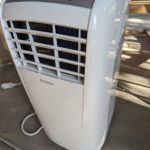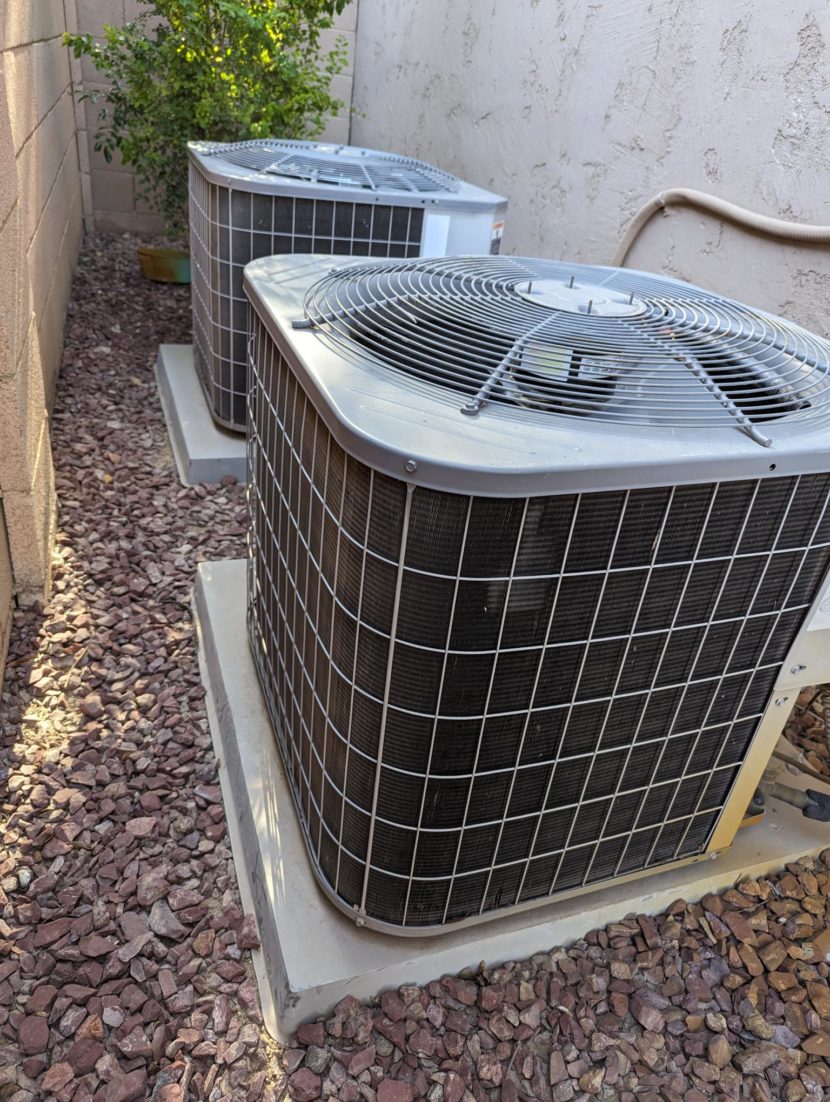When your AC calls it quits during the summer, getting a good night’s sleep can seem impossible.
Fear not. We’ve got you covered with tips on how to catch some Z’s when your AC is broken. From creating a DIY cooling system to optimizing your sleeping environment, we’ll show you how to beat the heat and get the rest you need.
Say goodbye to tossing and turning in a pool of sweat–with our practical advice, you’ll be snoozing in no time.
Kick back, relax, and discover the secrets to sleeping even when your trusty AC is on the fritz.
Unless it’s going to be above 100 degrees inside your house all night. Then it might be time to consider finding a cooling shelter. There are only so many clothes you can take off.
Key takeaways
-
Stay hydrated: Drink plenty of water throughout the day to stay hydrated, especially when dealing with heat at night.
-
Optimize your sleepwear: Choose breathable, lightweight sleepwear to help your body stay cool during the night. Alternately, sleep in the nude.
-
Adjust your environment: Use fans or open windows to circulate air and create a cooler sleeping environment.
-
Cooling your room naturally: Try placing a bowl of ice in front of a fan to cool down the room without AC.
-
Evening routine adjustments: Modify your evening routine to include relaxing activities that help your body prepare for sleep in a hot environment.
-
Consider cooling alternatives: Explore options like portable air conditioners or cooling mats to find alternative ways to cool down when your AC is broken. Sometimes it’s cooler to sleep outside. Is sleeping at a friend’s house or in a hotel possible?
- In cases of extreme heat, get help. Heat kills more people than other natural disasters like hurricanes and floods. Unless it’s in a place that usually doesn’t get hot, the deaths really don’t make the news. For example, in Phoenix, AZ in 2023, more than 361 people died.

In extreme heat, not having AC is an emergency. In many communities, dialing 211 can get you connected to lifesaving community resources.
Understanding sleep and heat
Maintaining optimal temperature
To ensure a good night’s sleep, maintain a room temperature between 68-72°F. Do your best to avoid extremes below 65°F or above 75°F as they can disrupt your sleep quality.
Impact of body heat
Your body heat plays a crucial role in regulating your sleep. When your body temperature is too high, it becomes challenging to fall asleep and stay asleep throughout the night.
Coping with heat waves
During a heat wave, find ways to cool down before bedtime. Consider taking a cool shower or using fans to lower your body temperature.
Watch out for heat exhaustion.
Too much heat can kill. When dealing with extreme heat, look out for serious health complications. Symptoms include:
- Muscle cramps
- Headache
- Nausea
- Fatigue
- Dizziness or confusion
- Excessive sweating with cold, clammy skin
Preparing for bed
Use thin linen
When preparing for bed without your AC, opt for thin cotton or linen sheets. These materials are breathable and can help regulate your body temperature while you sleep. The lightweight nature of these sheets allows for better airflow, preventing you from overheating during the night.
Cool wet cloths
Before bedtime, consider placing cool, wet cloths on different parts of your body. This simple trick can lower your body temperature, making it easier for you to fall asleep despite the heat. Focus on areas like your forehead, neck, and feet to experience a cooling sensation that promotes relaxation.
Sleep on lower floors
To avoid the heat rising and disrupting your sleep, choose to sleep on a lower floor if possible. Heat naturally rises, so sleeping on a higher level of your home may lead to discomfort and difficulty falling asleep.
Optimize your sleepwear
Choose breathable fabrics
When choosing your sleepwear, opt for breathable fabrics like cotton or linen. These materials allow for better air circulation, keeping you cool and comfortable throughout the night. The lightweight nature of these fabrics prevents you from feeling overheated, promoting a more restful sleep experience.
Prioritize comfort and airflow
To ensure optimal comfort and airflow while sleeping with a broken AC, select loose-fitting pajamas. Tight clothing can restrict movement and airflow, leading to discomfort and potential disturbances in your sleep. Loose-fitting sleepwear allows for better ventilation, preventing you from feeling sweaty or sticky during the night.
Moisture-wicking fabrics, such as certain blends of polyester or specialized performance materials, are designed to pull sweat away from your body. By choosing sleepwear with moisture-wicking properties, you can stay dry and cozy even without the cooling effects of an AC. This feature helps if you tend to perspire a lot while sleeping.
Alternatively, consider sleeping in the nude.
Cool down strategies
Use cooling gel pads
When your AC is broken, place cooling gel pads on your bed to regulate body temperature. These pads can provide a refreshing sensation and help you sleep comfortably.
Cooling gel pads are designed to dissipate heat from your body, promoting a cooler sleeping environment.
Take a cold shower
Prepare for bedtime by taking a refreshing cool shower that’s as cold as you can stand it. This can lower your body temperature, making it easier for you to fall asleep.
A cool shower before bed can help relax your muscles and calm your mind, creating an optimal environment for restful sleep. The water’s coolness can offset the lack of AC and provide relief from the heat.
Cooling mist spray
Combat the discomfort of a broken AC by using a cooling mist spray on your skin. Use a spray bottle that projects a mist. This quick and effective solution can refresh you.
The cooling mist spray acts as a barrier against heat, offering temporary relief from the warmth in your surroundings. It also provides a burst of freshness to enhance your overall sleeping experience.
Blow hot air out
If the air outside is cooler than the air inside your room, blow the hot air out. Open a window to let the cooler air in, then point a fan so the hot air is blown out of your room.
Adjust your environment
Keep blinds closed
When your AC is broken, keep blinds and windows closed during the day to block out the sun’s heat. By doing this, you prevent additional warmth from entering your room.
Use fans for air circulation
Utilize fans to circulate air and create a cooling effect in your room. Placing fans strategically can help distribute cooler air and make the room more comfortable for sleeping. Even though it may not lower the temperature drastically, it can provide some relief on hot nights.
Consider a dehumidifier
In situations where your AC is not working, consider using a dehumidifier to reduce humidity levels in your room. High humidity can make the room feel warmer than it is, causing discomfort while trying to sleep. By reducing moisture levels, a dehumidifier can help create a more pleasant sleeping environment.
Stay hydrated
Keep water handy
Keep a bottle of water by your bedside so you can access it when you feel thirsty at night. Staying hydrated is crucial for regulating your body temperature and ensuring a more comfortable sleep.
Hydrate throughout the day
Drinking water during the day is essential when your AC is broken and the temperatures are soaring. Dehydration can lead to various health issues, so maintain your body’s hydration levels.
Eat hydrating foods
Incorporate fruits and vegetables into your diet. These foods contain high amounts of moisture, which can help replenish lost fluids in your body. Fruits like watermelon and cucumbers are refreshing and also have water in them.
Avoid dehydrating drinks
Steer clear of beverages that can dehydrate you further, such as coffee or alcohol. These drinks can have a diuretic effect on your body, leading to increased fluid loss and further exacerbating dehydration.
Create a DIY cooling system
Fill a bowl with ice water and place it in front of a fan in your room. This simple trick can help cool down the air around you, providing some relief from the heat when your AC is out of order.
Evening routine adjustments
Limit alcohol
When you are dealing with a broken AC, it’s crucial to limit your alcohol consumption in the evening. Alcohol can lead to dehydration, which may disrupt your sleep. Opt for water or non-alcoholic beverages instead.
Avoid heavy meals
To maintain a comfortable body temperature for sleep, avoid consuming heavy meals close to bedtime. These meals can increase your body temperature, making it harder to cool down and fall asleep peacefully.
Cooling your room naturally
Installing units
Consider installing window units or exploring forced-air AC units if your budget allows. These options can help provide cool air efficiently, especially during hot summer nights. Window units are easy to install and can cool down small to medium-sized rooms.
Keep sunlight out
To maintain a cooler environment in your room, keep your curtains and blinds closed during the day. This helps block out sunlight and prevents excessive heat from entering your space. By doing so, you can create a more comfortable atmosphere for sleeping.
Utilize natural ventilation
Use natural ventilation by opening windows at night to let cooler air circulate in your room. This method allows fresh air to flow through your space, providing a refreshing breeze that can help regulate the temperature. Using a fan in conjunction with open windows can enhance the circulation of cool air.
Considering cooling alternatives
Exploring options
When your AC is broken, research various cooling alternatives to ensure a comfortable sleep environment. Look into monthly payment plans offered by local heating and cooling companies for AC installation. This option can provide a long-term solution to your cooling needs.
Consider inquiring with your landlord about the feasibility of adding an AC unit if you are renting. Landlords may be willing to invest in improving the property’s amenities, benefiting both you and future tenants. This proactive approach can lead to a more permanent cooling solution.
Years ago, before air conditioning and evaporative cooling were invented, people slept outside on screened-in porches. Doing so was more comfortable than sleeping in a hot house. While you might not have access to a porch like that, would it be possible to sleep outside?
Portable AC units
Research portable AC units as a temporary cooling measure until your main AC system is repaired. These units are versatile and can be moved from room to room, providing targeted cooling where needed. Portable AC units often require minimal installation, making them convenient for immediate relief.

When selecting a portable AC unit, prioritize models offering adjustable temperature settings and energy-efficient features. Opt for units with easy-to-clean filters to maintain optimal performance. Consider the unit’s BTU rating to ensure it adequately cools the size of your room.
-
Pros:
-
Portability allows for flexible cooling options
-
Easy installation without the need for professional assistance
-
-
Cons:
-
May produce more noise compared to central AC systems
-
Limited cooling capacity for larger spaces
-
Steps to setting up a portable AC Unit
-
Position the unit near a window or sliding door for proper ventilation.
-
Extend the exhaust hose outside through the window opening.
-
Plug in the unit and adjust the settings based on your comfort preferences.
-
Regularly clean and maintain the filters to ensure efficient operation.
Exploring these cooling alternatives empowers you to create a conducive sleep environment even when facing AC issues. By being proactive and resourceful, you can mitigate discomfort during hot nights.
In dealing with a broken AC, remember your sleep matters. By implementing the strategies outlined, you can still achieve restful nights even in the heat. Prioritize your comfort and well-being by adapting your routine and environment to suit the circumstances. Opt for cooling alternatives to ensure a peaceful night’s rest despite the challenges of a malfunctioning AC. Your body and mind will thank you for the effort you put into creating a conducive sleep environment.
Take charge of your sleep quality even when facing obstacles like a broken AC. With these adjustments and considerations, you can ensure your rest remains uninterrupted and rejuvenating. Stay proactive in finding solutions that work for you, allowing yourself to wake up refreshed and ready to tackle the day ahead.
Frequently Asked Questions
How does heat affect sleep quality?
Heat can disrupt your body’s natural temperature regulation, making it harder to fall and stay asleep. High temperatures can lead to restlessness, sweating, and discomfort, all of which can reduce the overall quality of your sleep.
What are some effective strategies to cool down before bed?
Taking a cool shower, using a damp cloth on pulse points, or placing ice packs at the foot of your bed can help lower your body temperature and signal to your brain that it’s time to sleep.
Is it important to wear specific sleepwear during hot nights?
Opt for lightweight, breathable fabrics like cotton or moisture-wicking materials that allow heat to escape from your body. Loose-fitting clothing can also promote better air circulation and prevent overheating while you sleep.
How can adjusting my environment improve my sleep without AC?
Use fans to create airflow in your room, and position them near windows for cross ventilation. Keep curtains closed during the day to block out sunlight and heat. Consider using blackout curtains or blinds to maintain a cooler environment conducive to sleep.
Are there any natural ways to cool down a room without an air conditioner?
Try placing a bowl of ice in front of a fan or hanging wet sheets in front of open windows. You can also use a dehumidifier to reduce moisture levels in the air, which can make the room feel cooler.
Articles from around the net:
Also on the blog:
